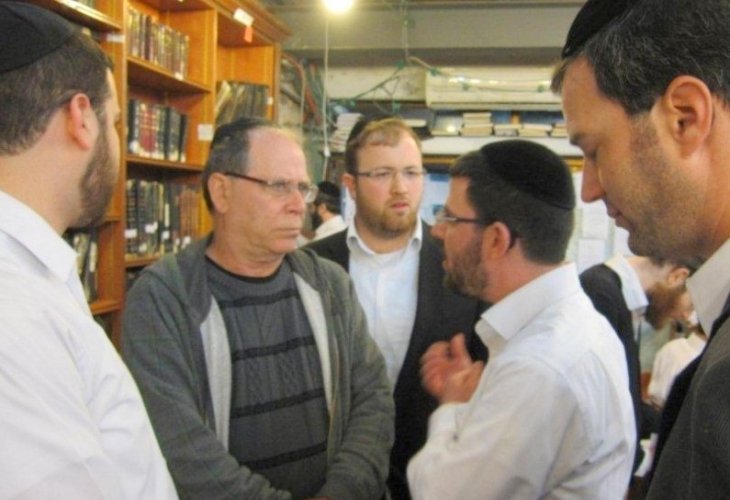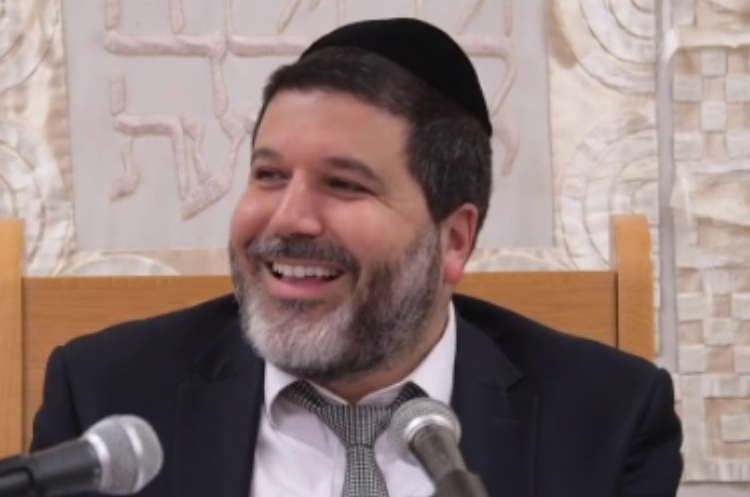Rabbi Ofir Malka: "People Stuck in Matches, or Suffering - It's All Written on Rosh Hashanah"
Rabbi Ofir Malka is currently busy with ruling on the laws concerning the month of Elul and the High Holy Days, delivering lectures and broadcasts, and writing new books. How does he manage to balance it all? An in-depth and fascinating interview reveals why it is so important to increase one's spiritual strength during these days.
 (Photo: shutterstock)
(Photo: shutterstock)These days, finding free time to talk to Rabbi Ofir Malka is exceedingly difficult. Rabbi Malka, who integrates long hours of Torah study, delivering lectures and radio broadcasts, and writing innovations and books into his daily schedule, is exceptionally busy during this period. Several times we scheduled a talk with his secretary, but at the last moment, we were told, "The rabbi hasn't finished studying yet" or "The rabbi is required for urgent consultation at the halachic council," and similar reasons.
Finally, in a late-night hour, when we thought we might miss the chance for a holiday-related interview, his secretary contacted us. "The rabbi has an hour free for an interview," he announced, and we were, of course, glad to speak. It was moving to see that when the rabbi clears his time for us, the time is dedicated to us in every sense of the word. As if there's nothing else in his world but to converse with Hidabroot website readers about the holiday topics.
"Only With Heavenly Assistance"
Although we prepared a list of questions, we couldn't help asking the most intriguing one first: Could the rabbi explain how he finds time for everything? Maybe we can also learn how to utilize every moment of our day...
"Firstly," Rabbi Malka responds, "we all must always know that we are guided solely by Siyaata Dishmaya (Heavenly assistance). Without Siyaata Dishmaya, no one can move a finger, lift a fork, open a book, let alone write a book. Everything comes through Siyaata Dishmaya. Without it, a Jewish person is worth nothing. A person themselves has no power to do things, and if Hashem does not guide them and provide them with strength, they actually have no capability at all.
"I always liken it to a puppet connected by strings - it can do nothing by its own strength. Although to an observer, it seems as if it sings, walks, and dances. So, too, in our daily lives, we are just like that. Only the one holding the strings runs us. I personally pray several times a day - that Hashem grants me Siyaata Dishmaya to do what needs to be done and to truly fulfill the will of Hashem."
When Rabbi Malka talks about his daily schedule, he manages to surprise: "The truth is, by my nature, I am not a person who likes to go out and be among the crowd. I always prefer to be within my four cubits, to sit, write, and study. That is my nature, and that is what I love and connect to. But I understand that Hashem does not want this from me. He wants me to go out to the public and use my abilities to spread the Torah further, so despite the difficulty, I do it. If a person does things against their nature and desires, then Hashem knows to return, and He doesn't like to remain in debt. Furthermore, Hashem granted me a truly great gift – Rabbi Eyal Ben-Zikri, the CEO of the halachic council. He handles everything around me. He does everything full of faith and pure fear of Heaven, for His sake. I genuinely saw how Hashem helps me.
"I can also say that I encounter many opportunities with many people. When they did what was incumbent upon them, Hashem rewarded them manifold, especially in situations unrelated to personal issues but those concerning the public. In such situations, Hashem returns more than could be imagined, with much Siyaata Dishmaya, and so the matters are well arranged.
"Regarding myself, I can say most sincerely and truthfully – I have neither talent nor memory. The most complex thing is seeing how to combine the books with the lectures, with studying, and with the family, which is, of course, the most important thing in the world. Because one must first and foremost be a husband to his wife and a father to his children, one must know how to balance all these matters. As written in the Gemara, 'Whoever says I have only Torah, does not even have Torah.' Our task is to know how to integrate also the surrounding life."
The Halachic Council: 24 Hours a Day in Five Languages
Rabbi Malka leads the 'Lamase Halacha' halachic council. The rabbi shares: "We started with just two hours a week. During those two hours, we answered the public and responded to a variety of questions. Over time, we saw there were numerous questions, and I couldn't respond to everyone in such a short time, so we decided to extend by another two hours, and later added another two. Who could have dreamed at that time that we would reach a day when the halachic office operates 24 hours a day? Today, more than 70 halachic advisors, scholars in various fields, answer questions truly for the sake of Heaven in a wide range of topics and multiple languages – Yiddish, English, French, and Spanish. Recently, we also added advisors answering questions about Shalom Bayit and child upbringing, alongside the halachic field."
 Rabbi Ofir Malka
Rabbi Ofir MalkaRabbi Malka notes that many of the advisors are people he had the privilege to meet through the global halachic quiz competition. "The quiz encouraged many yeshiva students to take exams and engage in studying very important halachot in the Shulchan Aruch. That's how we got to know them and integrated them into our halachic office. Other advisors here may not have come through the quiz, but they are yeshiva students who studied many important subjects throughout their lives, yet lacked practical halachic experience. Because not everyone who knows and is proficient can 'practice halacha.' So we offer them a sort of internship – listening and absorbing questions and answers, and discussing all halachic matters. This way, they undergo training for advising, and those who fit, take on the role.
Preparing for Judgment Day
Over the past years, the rabbi has published seven halachic books, with more on the way. When examining the books, one discovers a common factor – all the books are practical halacha books suitable for both Sephardi and Ashkenazi Jews.
"We strive for our books to be written in accessible language," the rabbi remarks, "so that a scholar studying the book finds what he's looking for, and a housewife interested in reading and knowing the laws will find her answers too."
Currently, there is a great demand for the book 'Halichot Moed' on the High Holy Days. Mentioning the book excites Rabbi Malka: "In the beginning of the book, we first bring words of ethics and strengthening for the month of Elul. We note what is advisable and necessary to strengthen, recommended commitments, and what we can do to arrive at Rosh Hashanah prepared. It's absolutely unthinkable for a person to go to trial unprepared. We all know that when facing a trial, a person hires a lawyer and advisors, investing money, so it is inconceivable to face a trial with the Creator, King of Kings, without any preparation."
And what does the rabbi suggest? How can we truly prepare ourselves?
"Firstly, it's imperative that everyone accepts upon themselves to look inward. To try to think of Rosh Hashanah not as just another holiday, but a Judgment Day. Hashem decides what will happen with us throughout the year, in all areas - livelihood, Shalom Bayit, success in children's education, and more. The Mishnah Berurah states that sometimes Hashem judges a person on Rosh Hashanah for many years ahead. Meaning, one cannot say 'This year wasn't successful, so no matter, I'll try harder next year.' That's not true because sometimes the judgment on Rosh Hashanah can determine what will happen to us even a decade ahead. Sometimes we see people stuck for years in matches or suffering from health issues for years, showing clearly that the trouble simply doesn't leave them. We must understand all this happened on a single Rosh Hashanah, thereby deciding a distress lasting several years. Conversely, sometimes a person experiences years-long success, and why is that? Because on a single Rosh Hashanah, it was determined what would happen over the following years.
Later in the book, Rabbi Malka presents various halachot of customs and laws in Elul. „Who among us has not faced questions like – if you hear selichot on the radio, can you answer amen or not? Is it necessary to wake up in the morning to say selichot, or can it also be said during the day? What exactly do they say in the synagogue, and what does an individual say at home?"
The questions become more complex when they shift to topics like the laws of Erev Rosh Hashanah, the fast on Erev Rosh Hashanah, annulment of vows for men and women, the custom of immersion in the mikveh on Erev Rosh Hashanah.
As well as customs relating to Rosh Hashanah itself – lighting candles, sometimes even three times since Shabbat follows immediately after Rosh Hashanah. How to manage rivers, what are the laws, the laws of eating sharp, sour, and dark foods on Rosh Hashanah, dipping the challah in salt and honey, the blessing of Shehechiyanu, setting out omens, and regarding private requests – when is it allowed to ask on Rosh Hashanah, and when is it not?
Is it permissible to sleep after the Rosh Hashanah meal? Is it permitted to bathe on Rosh Hashanah? Taking food out of the freezer and warming it on the hotplate, and countless more questions. "These are subjects that concern a lot of people," the rabbi explains, "if one doesn't learn the laws in advance, they might err, or conversely – be unnecessarily stringent. Not to mention the Shofar blowing laws, where it’s crucial to know exactly what to do and intend, and in which situations it's necessary to go back and hear the blowings again."
The rabbi emphasizes that there are also different halachot during the Ten Days of Repentance, as well as Erev Yom Kippur and Yom Kippur itself, and the book continues to accompany until the end of the Sukkot holiday and Hoshanah Rabbah.
Given that the book is halachic, do you recommend reading it from start to finish or leafing through it when facing a particular question?
"In principle, anyone who wants to know all the situations they might encounter during the holidays and know how to act regarding every matter – it's recommended to read the book from start to finish. This book is suitable for anyone, not complex at all, and written in clear and understandable language. Of course, it's not mandatory, and one can also flip through it or look up specific points according to the index of signs when encountering a particular topic."
And what about future plans? What is the rabbi working on these days?
"Currently, we are working feverishly on a comprehensive book that will include all the laws of blessings. The work is hard, but as I already mentioned – when guided by Siyaata Dishmaya and praying to Hashem, then we can hope to bless the completion soon."
In conclusion, Rabbi Malka wishes to express heartfelt gratitude to his wife. "A woman's wisdom builds her home, and if a woman does not enable her husband to sit and study, then the possibilities shrink. Thank Hashem, Hashem granted me a wife from a true Torah home, and she is the one who enables me to engage in these topics and dedicate my time to them. My immense thanks go to her."

